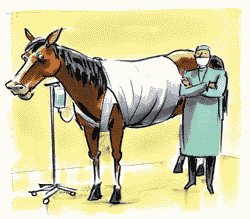|
Evaluate the animalís heart
rate, the sounds of the gut, the color of the gums, and then
contact your veterinarian with your findings. Your horseís
health care professional may prescribe a pain reliever and
also an intestinal muscle relaxant to help move out any
fecal matter. In many cases, this treatment will alleviate
the condition and your horse will be fine.
 If the horse
does not respond to this treatment, however, the
veterinarian will likely perform an exam himself, and then
more powerful pain relievers may be prescribed. In addition
to the foregoing, it will most likely be necessary to remove
excess gas and fluid build up from the horseís stomach via a
tube the vet will carefully introduce into the horseís
stomach through its nostril. This decompression is most
often the appropriate and successful solution to more
stubborn cases of colic. A rectal exam will confirm the
presence of dried fecal matter, other blockages, or even an
abnormal placement of the intestines. The veterinarian
should be able to give you a detailed description of the
colicís causes and the treatment options, after the
examination is over. If the horse
does not respond to this treatment, however, the
veterinarian will likely perform an exam himself, and then
more powerful pain relievers may be prescribed. In addition
to the foregoing, it will most likely be necessary to remove
excess gas and fluid build up from the horseís stomach via a
tube the vet will carefully introduce into the horseís
stomach through its nostril. This decompression is most
often the appropriate and successful solution to more
stubborn cases of colic. A rectal exam will confirm the
presence of dried fecal matter, other blockages, or even an
abnormal placement of the intestines. The veterinarian
should be able to give you a detailed description of the
colicís causes and the treatment options, after the
examination is over.
Should your horseís colic still be present even after the
described measures, surgery may be the only indicated
option. You must realize that time is of the essence when
surgery is the only answer to colic, and getting your horse
to the clinic must be accomplished quickly. Upon arrival at
the clinic, the horse will receive yet another physical
exam, but blood tests will also be taken to get important
information on hydration and possible infection. If your
horse is found to be dehydrated, intravenous fluids will be
introduced to help alleviate the pain and help the blockage
to hydrate and move out.
If hydration does not cure the colic, or if it is found
that gut damage has caused fecal matter to leak into the
belly, then surgery will be indicated. The horse will be
prepared for surgery and anesthetized. Once the surgeon has
opened the abdomen, there are several treatment options
available. For example, if a portion of the intestine moved
to the wrong spot because of gas build-up, the surgeon will
be able to remove the gas and the intestine will once again
be placed in its proper location. Twisted intestines can be
straightened and put back in position. Damaged portions of
the intestines can be cut out and remaining intestines will
be reconnected. In a small number of cases, this option is
not available because of the location of the ruptured
intestine, and the horse will not be able to be helped. Yet,
this is a rather rare occurrence! If indicated, the surgeon
may also flush out any hard fecal matter. After the surgery,
the animalís abdomen is closed up, with recovery taking up
to ten weeks. Your veterinarian may discuss a special diet
in keeping with the particulars of the case, to help the gut
to heal and to also prevent this colic from recurring.

|